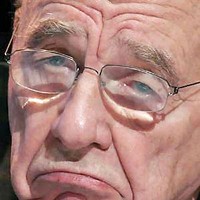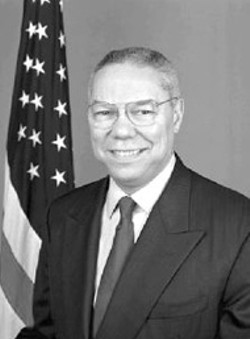Still, Powell is no different than his would-be Caesar in Washington. Powell got one of his first big boosts in the military by attempting to whitewash the My Lai massacre in Vietnam. He also participated in the attempted cover-up of the Iran-Contra scandal.
I started thinking of the similarities between the fall of 1990 and the winter of 2003. The lineup 12 years ago was Poppa Bush, Dick Cheney (then secretary of defense) and Powell (the top general). The roster today is Bush II, Cheney (veep) and Powell (secretary of state).
And what do we know about what happened in 1990? Well, the Bush 41 administration told a lot of lies. Here are a few, in case you've forgotten -- or, as is more likely the case, the neutered, pandering media never exposed them.
Prior to the launch of Desert Storm, it was widely agreed that an invasion of Kuwait wasn't sufficient provocation for the United States to go to war. Indeed, Bush's envoy, April Glaspie, had green-lighted the Iraqis, telling them that the United States had "no opinion" on the dispute with Kuwait.
What would have justified war -- according to Norman Schwarzkopf in his book, It Doesn't Take a Hero -- was an invasion of Saudi Arabia. So the administration in September 1990 conjured up "classified" satellite photos -- the very same sort of "evidence" touted by Powell last week -- showing 265,000 Iraqi soldiers massed on the Saudi border.
At the St. Petersburg Times, one of the nation's best newspapers (its excellence secured because it is owned by a foundation, not a corporation), reporter Jean Heller embraced that most prized of journalistic qualities, skepticism. She spent about $3,000 to purchase her own satellite photographs. Guess what they showed? No Iraqi military buildup on the Saudi border. Zip, none at all.
The Bushies had deceived the world. It took Powell more than a year to admit the lie (but his bogus photos are still classified) -- and by then the war had been fought and somewhere between 100,000 and 300,000 Iraqis had been killed. Many more, including tens of thousands of children, would die later due to our destruction of the country's infrastructure and the cruel sanctions we imposed (which only strengthened Saddam Hussein's iron grip on his people).
"It was a very big deception," Times reporter Heller told me. "It brings into question how convincing Powell's evidence really is."
There were, of course, many other deceptions, such as the much-repeated myth that Iraqi soldiers had yanked newborn infants from incubators in a Kuwaiti hospital. That turned out to be a total fabrication by a giant American PR company, Hill & Knowlton.
The ultimate con has to do with Saddam's "evil" nature (which I don't dispute). There's no doubt Saddam -- with US blessing and support -- used poisons against Iran. And, in March 1988, he gassed and killed 5,000 Kurdish Iraqis at the city of Halabja. The question is why did we provide him with those weapons and the intelligence needed to execute his slaughters -- and continue to do so for 18 months after Halabja? Why did we grab Iraq's recent 12,000-page declaration of its weapons program, and strip from it the names of the US, European and Japanese companies that had aided Saddam's nuclear, biological and chemical weapons programs? Where does the "evil" stop?
Powell promised the Security Council that "every statement I make today is backed up by sources, solid sources. These are not assertions. What we're giving you are facts and conclusions based on solid intelligence."
The very heart of Powell's "proof" is a fraud. He claimed to the Security Council that one compound was a poison factory. The British press rushed to the compound, and according to The Guardian, found:
"The terrorist factory was nothing of the kind -- more a dilapidated collection of concrete outbuildings at the foot of a grassy sloping hill. Behind the barbed wire, and a courtyard strewn with broken rocket parts, are a few empty concrete houses. There is a bakery. There is no sign of chemical weapons anywhere -- only the smell of paraffin and vegetable ghee used for cooking."
One of the linchpins among Powell's "solid sources" was a British assessment titled: "Iraq -- Its Infrastructure of Concealment, Deception and Intimidation."
Oops, a British TV network exposed the report as being largely plagiarized, and much of that cribbing from a paper by a university graduate student.
But the American media bought Powell's speech. There are few, if any, Jean Heller-caliber reporters covering the war today. Certainly not at the Charlotte Observer. They gushed all over the "case against Iraq," and never suggested that Powell might -- once again -- be lying. Or, at best, spinning.
"There's a difference between journalism and stenography," says Danny Schechter, executive editor of Mediachannel.org and one of the nation's foremost critics of Big Media. "What you had with the coverage of Powell was stenography."
I asked someone who is far from being a defender of Saddam: the former chief of counter-terrorism operations for the CIA, Vince Cannistraro.
"They're going to war," he said of the Bush neocons. "This was public relations. Did Powell make the case to go to war? No, he didn't make the case. But that's irrelevant. The decision was made a long time ago."
Cannistraro defended the "technical stuff" as "pretty good." He doesn't think the photos and intercepts are concoctions. But he noted that if Saddam is playing a shell game now, it's no different than in previous years. "The last time we had inspections, we found a lot" of chemical and biological weapons, he said. "This time, we have inspections and we're not finding anything, and Iraq's ability to conceal things is considerably weakened. That doesn't mean they're not there. But if he does have weapons, they're not in great quantities."
The bottom line, Cannistraro said, is that Iraq "can't be a threat to us or its neighbors. All Powell did is make the case for more rigorous inspections."
If there is a real threat to America right now, it's from North Korea, according to the ex-spymaster. "It's scary. The administration is betting North Korea is just upping the ante. But we're betting on a government that isn't rational and that has a much greater capacity for weapons of mass destruction. Our own soldiers and our allies are what we're gambling."
Despite the unprecedented growth in anti-war sentiment, the American media refuse to provide a balanced perspective. There was precious little debate on Powell's speech. In Europe, by comparison, the dialogue was heated. Britain's Guardian had eight pages of intense analysis. Israel's Ha'aretz reported that much of Powell's "intelligence" came from Ariel Sharon's government -- meaning it is almost certainly politically tainted.
The war is close. We'll destroy an enemy, kill hundreds of thousands of innocents, and maybe Saddam. As Pat Buchanan, a true conservative, has written, "This is not a limited operation. It marks the advent of empire, and once our republic crosses that threshold, we enter territory where the only guideposts are imperial failures gone before."
John Sugg is Senior Editor of Creative Loafing in Atlanta.
Speaking of News_feature.html
-

When HIV comes home
Jul 20, 2005 -

Rasslin' Pioneers
Jul 13, 2005 -

Geddings on McCrory: "This guy is vulnerable"
Jul 6, 2005 - More »
Latest in News Feature
More by John Sugg
-

Fear and Loafing on the way to moguldom
Aug 8, 2007 -
NASCAR Museum: The Proletariat's Burden
Mar 1, 2006 -
Columnist teaches where he once fled from racists
Sep 21, 2005 - More »
Calendar
-

Queen Charlotte Fair @ Route 29 Pavilion
-

NEW WINDOW GALLERY-Pat Rhea-ACRYLIC PAINTINGS-April 05-30 2024 VALDESE, NC 28690 @ New Window Gallery/Play It Again Records
- Through April 30, 12 p.m.
-

TheDiscountCodes
-

Wine & Paint @ Blackfinn Ameripub- Ballantyne
-

Face to Face Foundation Gala @ The Revelry North End
-
Five Common Reasons Why Small Businesses Fail
-
Homer's night on the town 41
If you drank a shot with the Knights mascot on Sept. 20, you were basically harboring a fugitive
-
6 Factors to Consider When Buying Kratom Online 5










